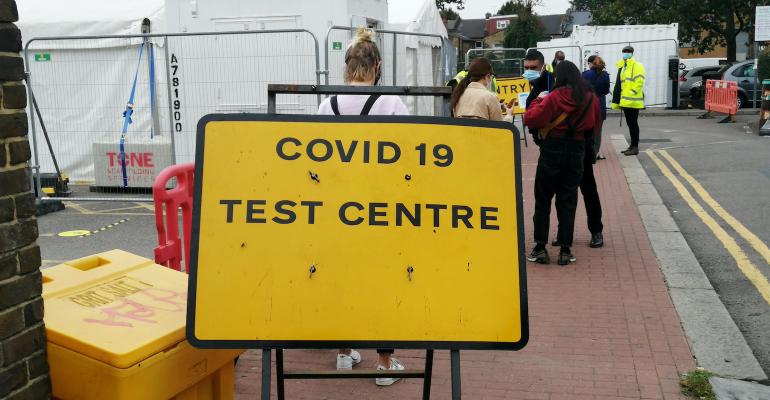Rapid COVID-19 diagnostic testing in the UK has generated good results, despite challenges - and much of this was because of effective collaboration across the nation, according to emergency medicine specialist Professor Rick Body.
He was providing an update on testing in Britain, along with achievements and learnings to date, during an Omnia Health Live Americas session moderated by Carlos Eduardo dos Santos Ferreira, President of the Brazilian Society of Clinical Pathologists (Sociedade Brasileira de Patologia Clinica).
Prof Body leads the COVID-19 National DiagnOstic Research and Evaluation Platform (CONDOR) in the UK, a publicly-funded programme that creates a single path for evaluating new diagnostic tests in hospitals.
He revealed the UK's testing strategy that comprises four pillars, including swab testing in hospitals for those with clinical need; serology testing for COVID-19 antibodies; swab testing in the wider population; and serology & swab testing for national surveillance, before sharing an update on tests to date.
In short, "the UK is doing a lot of tests," he said, showing a chart depicting daily new COVID-19 tests per 1,000 people, "and some of that is because we're in the middle of a second wave."
The chart shows the UK in highest place worldwide for rolling 7 day average as of 26 October 2020, ahead of France, the US, Germany, Canada, Australia, India and South Korea.
While the UK has a reasonable testing capacity, the question remains as to whether testing is done in the right way and at the right time to inform the pandemic response.
Diagnostic testing: what to evaluate
Prof Body suggested the following for consideration ahead of any new COVID-19 testing: mapping out current care pathways; identifying how POCT may be used to improve current pathways; and agreeing on the new care pathway.
In addition it was important to establish strong analytical validation of tests through limit of detection; estimating accuracy in stored/contrived samples; and evaluating biosafety.
Most importantly, the diagnostic accuracy of tests must be assessed, through prospective study, appropriate reference standard and appropriate statistical power.
The last point for consideration, Prof Body highlighted, was usability or human factors. If people can't use the test properly, it won't have the desired impact - especially for rapid tests, in nursing homes for example.
The CONDOR programme was set up to establish validation needs through a nationwide collaboration.
Funded from 1 June, it proceeded with generating as much evidence for new tests as possible through setting up multiple workstreams.
FALCON study
Within CONDOR a multi-centre study named FALCON (Facilitating AcceLerated Clinical validation Of novel diagnostics for COVID-19) was set up to look at diagnostic accuracy in hospitals, funded by Asthma UK and the National Institute for Health Research (NIHR), with Prof Body as Chief Investigator.
Currently there are 40-50 sites across the UK, and patients provide their consent to having extra samples taken.
It quickly became evident that the volume coming through hospitals was insufficient. The FALCON study aimed to gather evidence faster and therefore the programme was extended to include community testing centres across the country, alongside hospitals.
People in the community who had tested positive for COVID-19 were invited to the testing centre to evaluate sensitivity of lateral flow tests.
It was, Prof Body acknowledged, "a very successful method" - in little more than a month, 850 patients participated in testing centres. This was down in part to collaboration across the country that was "humbling", and project management support from Deloitte in its rapid delivery of workstreams.
Challenges
In August 2020, a group of senior politicians informed by scientists developed a white paper, "Taking the UK's Testing Strategy to the Next Level", calling on the UK government to change its testing strategy - and this has changed the UK's approach to testing, especially test evaluation.
This made planning "very tricky", Prof Body said. Samples sizes - and target product profiles that suggest what they should be - are usually set up in advance. But what's happening is that they are changing in the course of the evaluation - making it difficult to plan a strategy for clinical evidence.
In addition, it takes time to obtain prospective data in busy hospitals, and for diagnostic research. CONDOR relies on a network of clinical research nurses across the country who have been "outstanding" in getting this data quickly.
Prof Body questioned whether diagnostic research was budgeted appropriately, highlighting how it doesn't appear to receive the same attention as vaccine research or treatment research.

